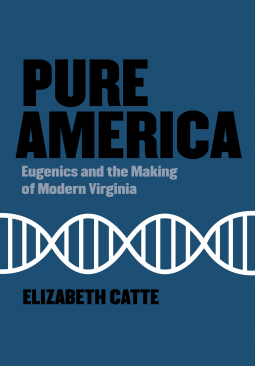Medical plantation. Sick. [Pure America: Eugenics and the Making of Modern Virginia by Elizabeth Catte]
Elizabeth Catte is a historian and writer living in Virginia, and the author of What You Are Getting Wrong About Appalachia (Belt Publishing 2018). She is an editor-at-large for West Virginia University Press and the co-founder of Passel, an applied history and consulting company.
I imagine my first exposure to the term "eugenics" must have come from Star Trek, specifically The Next Generation and Deep Space Nine. Indirectly, the story goes that there was a Eugenics War in the 2000s, and, as their respective stories take place in the 2300s, that whole period was just a dark blotch on the more recent history of humanity. In fact, generally speaking, that's what the human contingent of the Federation of Planets is all about. Promoting or challenging this idea that by being a space-faring, curious species, that innately we have moved past such nastiness. But that never is the case, is it?
In Elizabeth Catte's Pure America: Eugenics and the Making of Modern Virginia, the author lifts the veil on the national through the statewide and local eugenics efforts of the state of Virginia, examining its proponents and lasting legacy. When I opted to read this book I expected the discussion of forced sterilizations, that's a given with past and modern eugenics efforts. What took my by surprise was a new understanding of how warped the foundational philosophies were. The idea that there are some people who, apparently, wholeheartedly believe(d) poverty was a personal failing. That somehow those same believers also squared away in their minds further exploitation of those supposed lessers. The wild audacity.
But it's a sordid history of displacement, of enslavement, of imprisonment underneath quaint "historic" facades that Catte examines. And while that same sordid history underlies too many parks and building in the United States, it was a lot to consider it even on a small scale. And when you learn to see something in a new light you can't help but have a global reframing of existing and infiltrated systems. The idea of "stronger stock" and selective breeding, when applied onto animals is questionable. It always has been. But even more so after you've considered the same logic applied to people. But again, is this new? No, we know this logic was applied to enslaved and subjugated peoples in the different veins of American imperialism and nation building.
There's a lot that will stay with me after this read. What'll last is the fact the eugenics mentality is ingrained in too many institutions across the nation. That even when acknowledged, reparations are never enough. As I read this Virginian case study I kept thinking, this is mostly a story of white Virginians people applying that logic to other white Virginians. It saddens and enrages me to no end to imagine the fully racial or intersectional reality. That realization, it was a lot, but it was powerful. And no matter how uncomfortable or angry or frightened it made me, this was a fantastic read. The past must be learned, as much as possible, and confronted and reconciled by those who survive. 5 stars from me, and I will be recommending this to my friends.
Pure America (ISBN: 9781948742733) was published February 2021.

Comments
Post a Comment